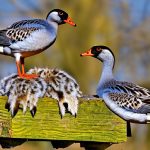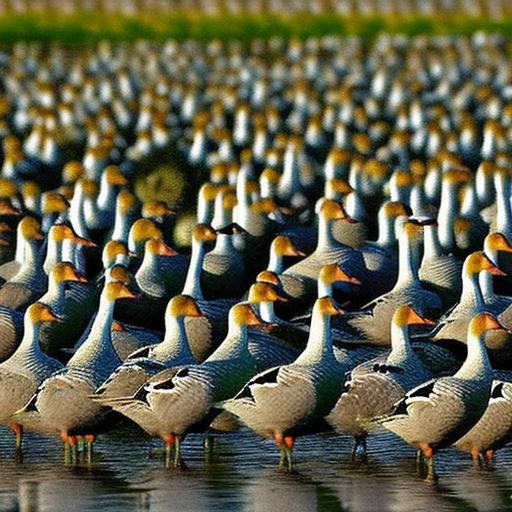Geese breeding is a fascinating and rewarding endeavor that requires a deep understanding of the natural behaviors and instincts of these majestic birds. Geese are known for their strong pair bonds and are monogamous, meaning they mate for life. This makes the selection of breeding pairs a crucial aspect of successful geese breeding. Understanding the breeding habits and instincts of geese is essential for ensuring the health and productivity of the breeding pairs.
Geese typically reach sexual maturity at around two years of age, at which point they will begin to form pair bonds and seek out a mate. Geese are known for their strong territorial instincts, and it is important to provide adequate space for breeding pairs to establish their own nesting areas. Additionally, geese are seasonal breeders, with the peak breeding season occurring in the spring. Understanding the natural breeding cycle of geese is essential for successful breeding and raising of goslings. By understanding the natural instincts and behaviors of geese, breeders can create an environment that supports the natural breeding process and ensures the health and well-being of the breeding pairs and their offspring.
Identifying Desired Traits in Geese Breeding Pairs
When selecting geese breeding pairs, it is important to identify desired traits that will contribute to the overall health and productivity of the offspring. One of the most important traits to consider is the overall health and vitality of the breeding pair. This includes assessing their physical condition, as well as their temperament and behavior. Additionally, breeders should consider the genetic traits of the breeding pair, including their lineage and any potential genetic predispositions to certain health issues.
Another important trait to consider when selecting geese breeding pairs is their ability to successfully raise and care for their offspring. This includes assessing the parenting instincts and behaviors of the breeding pair, as well as their ability to provide adequate care and protection for their goslings. Additionally, breeders should consider the overall productivity of the breeding pair, including their ability to produce healthy and viable offspring. By identifying desired traits in geese breeding pairs, breeders can ensure the overall success and productivity of their breeding program.
Evaluating Physical Characteristics of Geese
When evaluating the physical characteristics of geese breeding pairs, there are several key traits to consider. One of the most important physical characteristics to assess is the overall body condition of the breeding pair. This includes assessing their weight, muscle tone, and overall health. Additionally, breeders should consider the size and conformation of the breeding pair, as well as any potential physical deformities or abnormalities that may impact their ability to breed and care for their offspring.
Another important physical characteristic to evaluate in geese breeding pairs is their feather quality and condition. Healthy feathers are essential for maintaining body temperature and providing protection from the elements, so it is important to assess the overall condition of the feathers on the breeding pair. Additionally, breeders should consider the coloration and markings of the breeding pair, as well as any potential genetic traits that may impact the appearance of their offspring. By evaluating the physical characteristics of geese breeding pairs, breeders can ensure the overall health and vitality of their breeding program.
Assessing Temperament and Behavior
In addition to evaluating physical characteristics, it is important to assess the temperament and behavior of geese breeding pairs. One of the most important aspects to consider is the overall temperament of the breeding pair, including their level of aggression or docility. Geese with aggressive tendencies may pose a risk to their offspring or other members of the flock, so it is important to select breeding pairs with a calm and gentle temperament.
Another important behavior to assess in geese breeding pairs is their nesting and parenting instincts. Geese are known for their strong parental instincts and are dedicated caregivers to their goslings. It is important to select breeding pairs that demonstrate strong nesting behaviors and a commitment to caring for their offspring. Additionally, breeders should consider the overall social dynamics of the breeding pair, including their interactions with other members of the flock. By assessing the temperament and behavior of geese breeding pairs, breeders can ensure a harmonious and productive breeding environment.
Considering Health and Genetics
When selecting geese breeding pairs, it is crucial to consider their overall health and genetics. One of the most important aspects to consider is any potential genetic predispositions to certain health issues. By assessing the genetic lineage of the breeding pair, breeders can identify any potential health concerns that may impact the overall productivity and health of their offspring.
In addition to genetics, it is important to consider the overall health and vitality of the breeding pair. This includes assessing their overall physical condition, as well as any potential health issues that may impact their ability to breed and care for their offspring. By considering both health and genetics when selecting geese breeding pairs, breeders can ensure the overall success and productivity of their breeding program.
Selecting Geese Breeding Pairs for Your Specific Needs
When selecting geese breeding pairs, it is important to consider your specific needs and goals for your breeding program. This includes identifying desired traits and characteristics that will contribute to the overall success and productivity of your program. Whether you are breeding geese for meat production, egg production, or as ornamental birds, it is important to select breeding pairs that align with your specific goals.
Additionally, breeders should consider the overall compatibility of the breeding pair with other members of the flock. This includes assessing their social dynamics and interactions with other geese, as well as their ability to integrate into an existing flock. By selecting geese breeding pairs that align with your specific needs and goals, you can ensure a successful and productive breeding program.
Obtaining and Caring for Your Chosen Geese Breeding Pair
Once you have selected your geese breeding pair, it is important to provide them with a suitable environment that supports their natural instincts and behaviors. This includes providing adequate space for nesting and raising goslings, as well as access to fresh water and nutritious feed. Additionally, breeders should monitor the overall health and well-being of the breeding pair, providing any necessary veterinary care or support.
In addition to providing a suitable environment, it is important to monitor the overall productivity and success of your chosen geese breeding pair. This includes assessing their ability to successfully raise and care for their offspring, as well as monitoring any potential health issues or concerns that may arise. By obtaining and caring for your chosen geese breeding pair, you can ensure a successful and productive breeding program that supports the overall health and vitality of your flock.
Meet Walter, the feathered-friend fanatic of Florida! Nestled in the sunshine state, Walter struts through life with his feathered companions, clucking his way to happiness. With a coop that’s fancier than a five-star hotel, he’s the Don Juan of the chicken world. When he’s not teaching his hens to do the cha-cha, you’ll find him in a heated debate with his prized rooster, Sir Clucks-a-Lot. Walter’s poultry passion is no yolk; he’s the sunny-side-up guy you never knew you needed in your flock of friends!




